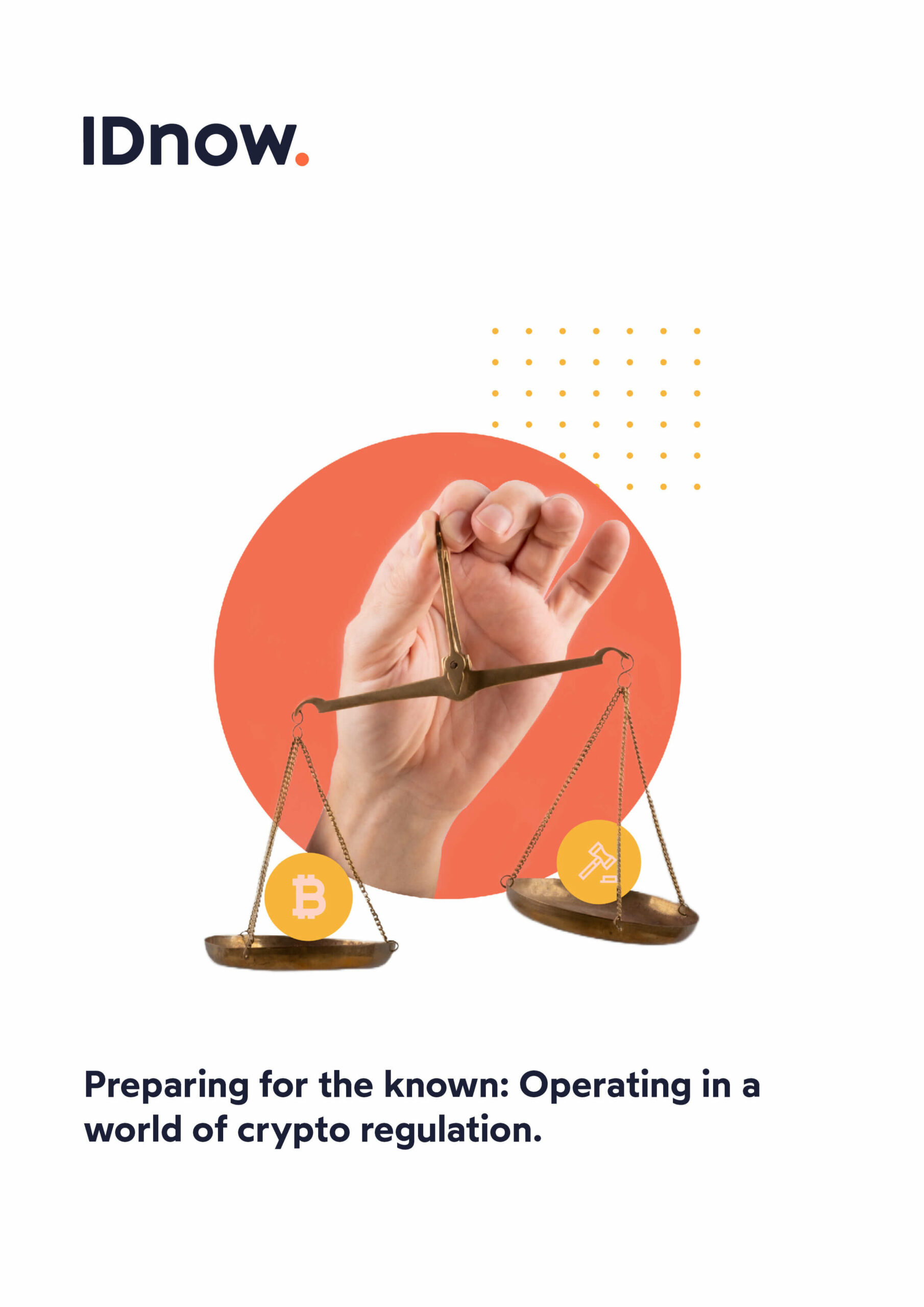New IDnow whitepaper, ‘Preparing for the known: Operating in a world of crypto regulation’, explores the challenges facing UK crypto exchanges in 2023 and beyond.
In April 2022, the UK government announced plans to make the UK a global hub for crypto asset technology and investment. This was a bold proclamation, especially considering how painfully prohibitive the UK crypto money laundering registration can be, and how difficult competing on the global stage will soon become as UK crypto exchanges juggle European regulations, such as MiCA or TFR, and its domestic equivalent.
With upcoming crypto-specific regulations from the EU and the UK in 2023, the crypto asset market is about to receive a level of protection and accountability that it has never experienced.
But, will bringing cryptocurrency into the mainstream and adding stability and accountability have a positive effect on crypto exchanges, or will organizations simply decide to trade elsewhere?
Is crypto regulated in the UK?
While firms await rules outlined in MiCA and the UK’s proposed crypto regulatory regime to come into force (expected in 2024), crypto firms that wish to operate in the UK must register with the Financial Conduct Authority (FCA), and therefore comply with the Money Laundering, Terrorist Financing, and Transfer of Funds Regulations 2017 (including the FATF guideline amendments). Only firms with appropriate Know Your Customer (KYC) processes, source of funds checks, and proof of funds checks, can be registered to ensure no illicit money is coming through the system.
How many UK crypto firms are currently registered?
At the beginning of 2023, out of 300 applications to the FCA, only 41 had become registered. FCA spokesperson, Charles Randell, Chair of the FCA and PSR said that more than 80% of crypto firms that had begun the process to become registered had either withdrawn their applications or been rejected. The most common reasons for not passing were that they did not meet the required AML standards.
“While some of the businesses which have applied to us have shown evidence of adequate systems and controls, many others fell well short of acceptable standards, and many have withdrawn their applications as we have scrutinized them. The state of those firms ignoring the requirement to register with us, or which have moved offshore to avoid registration could be even worse.
How important will MiCA be for UK crypto companies?
MiCA will establish rules for the issuance, admission to trading, and operation of crypto assets. It will also set requirements for providers of crypto asset services to clients in the EU.
This regulatory framework will require exchanges to implement AML measures, such as Customer Due Diligence and the reporting of suspicious transactions.
Does the UK have a MiCA-equivalent regulatory framework?
In February 2023, HM Treasury released a new consultation paper, ‘Future financial services regulatory regime for crypto assets.’ Cryptoasset firms, technology companies, and financial institutions were invited to provide feedback on the UK’s answer to MiCA. Here’s what we had to say on the UK’s proposed regulatory regime. How closely the final version will resemble the EU’s crypto regulatory framework, MiCA, remains to be seen. What is very unlikely, though, is it coming into force before MiCA does, in 2024.
Brexit and UK crypto regulations.
Despite the UK no longer being legally required to follow the rules outlined in the EU’s Fifth Anti-Money Laundering Directive (5AMLD), the UK did decide to transpose the cryptocurrency regulation criteria from 5AMLD and 6AMLD into domestic legislation. Other relevant rules include the Financial Promotions Regime, which is currently under consultation, and the Financial Services and Markets Bill, which includes stablecoin regulation. Crypto businesses that are required to be registered are crypto asset exchange providers, which exchange crypto assets for money or vice-versa, or swap crypto assets, and custodian wallet providers, which safeguard or administer crypto assets on behalf of their customers.
As the UK’s laws regarding cryptocurrency are a) not particularly clear, and b) do not offer any protection or authority outside of the UK, it is very likely that UK consumers may instead go to offshore providers, which UK regulators have no authority over. In the internet era, where consumers can access services of international platforms as easily as domestic, the FCA, alongside other financial regulators from around the world, face an uphill battle to ensure its citizens are not being targeted by foreign crypto exchanges.
Watch our Global Head of Crypto and Fintech, Jason Tucker-Feltham attempt to explain the UK’s proposed crypto regime, in 90 seconds or less.
European crypto regulations to steady crypto ship.
There were two major developments in EU crypto regulation in 2022. The first was an extension of the European Transfer of Funds Regulation to include crypto assets, meaning the sender and beneficiary of all applicable or centralized crypto transactions will need to be identified.
While those in the crypto community that relished the anonymity of decentralized transactions are likely to be unhappy with the development, others see it as a sign that regulation is finally catching up with the industry and bringing some much-needed clarity for crypto asset service providers.
Updates to the TRF regulation are expected to come into effect as part of a greater package of updates to AMLD5 in 2023. TRF updates are also expected to be aligned to the second major development in the EU crypto space, the Markets in Crytpo-Assets (MiCA) regulation, which was given the green light by the European Parliament in April 2023, and is expected to be in force by 2024.
MiCA is regarded as the first ever regulatory framework for crypto assets, and covers three different types:
- Utility tokens, which provide access to goods or services;
- Payment tokens, which are used as a means of payment or can be traded for other MiCA-regulated token;
- E-money tokens, which are backed by fiat currencies and used to make electronic payments.
MiCA has established rules for the issuance, admission to trading, and operation of crypto assets, as well as requirements for the providers of crypto asset services. It has several benefits, including better regulatory clarity for CASPs in the EU, improved investor protection, enhanced financial stability, and the promotion of innovation. MiCA will impact all CASPs offering services to clients in the EU, including crypto asset exchange providers, custodian wallet providers, issuers of initial coin offerings (ICOs) and other CASPs.
Although MiCA will not apply to UK crypto service providers (or any non-European provider), if UK providers plan on targeting EU investors or offer their services in the EU, then they will need to obtain a MiCA authorization and follow TRF requirements, to ensure they are compliant with both UK and EU regulations.
As MiCA will require CASPs to put in place AML measures, such as Customer Due Diligence and reporting of suspicious transactions, it will complement the EU’s existing Anti-Money Laundering Directive (AMLD) by providing a specific regulatory framework for crypto assets. The crypto asset regulatory framework will also enable national authorities to exchange information on suspected money laundering or terrorist financing activities.
In February 2023, HM Treasury released a paper, detailing its proposed crypto regime for the UK, inviting cryptoasset firms, technology companies, and financial institutions to provide feedback. Read our ‘Consultation period ends on UK’s proposed crypto regulatory regime.’ blog for more information.
In October 2023, the FCA officially launched its financial promotions restrictions for the UK’s crypto industry. Read more about the UK’s financial promotions regime here.
Riding the crypto waves and crashes.
In their short existence, cryptocurrencies have experienced an extremely high level of volatility. The price of Bitcoin broke $1,000 for the first time in 2017, and rose to nearly $20,000 in the same year, only for the price to dip to nearly $3,000 within the space of a few months. In 2022, the crypto market is at the mercy of considerable bull and bear markets, although many crypto users are predicting that this will change as the crypto market matures.
A considerable volume of crypto assets is used by bad actors for money laundering, fraud and payment for other nefarious activities because it can be transferred quickly and with a high degree of privacy. Indeed, in the early days, cryptocurrency platforms did not require customers to undergo ID verification or background/credit card checks. In fact, some still don’t. Read more about the the novel, and potentially problematic approach by new crypto platform, Worldcoin to eschew traditional customer onbroading in favour of iris scans.
Putting the KYC into crypto.
So, how feasible is the task of not only taming UK’s crypto Wild West, but building a world-leading crypto hub?
The UK has certainly started 2023 in earnest, with the UK’s National Crime Agency (NCA) announcement that it will form a brand-new division specifically designed to tackle crypto crime. The NCA’s ‘Crypto Cell’ will initially contain just five officers who will be solely responsible for providing support on new and existing crypto-related investigations. A little over a month later, HM Treasury released a new consultation paper, ‘Future financial services regulatory regime for cryptoassets.’
Underpinning many of the debates regarding regulations is the need for crypto exchanges to be able to identify who their customers are. In an industry where anonymity is often touted as one of its biggest selling points, this will be no easy feat. Therefore, it’s important to not only offer secure customer onboarding, but for the process to remain as convenient as possible.
Interested in learning more about crypto? Check out our Fintech Spotlight Interview with Alex Pillow, Director, Market Strategy at Moody’s Analytics KYC.
By

Jody Houton
Content Manager at IDnow
Connect with Jody on LinkedIn
Preparing for the known: Operating in a world of crypto regulation.





